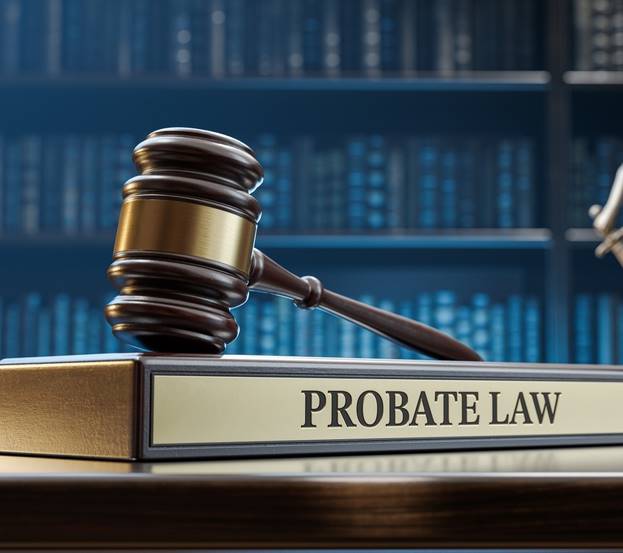Probate in Arizona?
We Can Help!
- Responsive, Communicative
- Over 30 Years Experience
- Discover the Holt Trust Difference
- Call Today To Schedule Your Consultation Speak to an Attorney
What is Probate in Arizona, and
What Should You Know About it?

Probate is a term that often stirs anxiety and confusion among those who have never had to deal with the process before. However, understanding probate, its functions, and the probate administration process can significantly alleviate these concerns.
We aim to cut through the hype and provide clear, concise information about probate and probate administration. By the end of this page, you should have a solid grasp of what probate entails, its importance, and how to navigate it efficiently.
Key Components of Probate in Arizona:
What is Probate?
Probate is the legal process by which a deceased person's estate is managed and distributed. This process involves validating the deceased's will (if there is one), paying off debts, and distributing the remaining assets to the rightful heirs. Probate ensures that the transfer of property is carried out in an orderly and legal manner.
The Function of Probate Court
The primary function of the probate court is to oversee the transfer of title (ownership) of assets from the deceased person to their heirs. The court ensures that the deceased person's debts are paid and that the remaining assets are distributed according to their wishes as expressed in their will, or according to state law if there is no will.
Questions?
Speak to an Attorney NowAvoiding Probate
One way to avoid the probate process entirely is through the creation of a properly funded living trust. A living trust allows you to transfer your assets into a trust during your lifetime, with instructions on how those assets should be managed and distributed after your death. Because the assets are owned by the trust, they do not go through probate upon your death.
The Probate Process
If a living trust is not in place, probate becomes necessary. The probate process can either be formal or informal and can involve either a will (testate) or no will (intestate).
Formal vs. Informal Probate
Formal Probate: This type of probate involves a judge at several stages of the case. Formal probate requires written notice to all interested parties each time a significant action is taken, often leading to hearings at the courthouse. This can be a lengthy and expensive process, but it is necessary for complex cases or when there is disagreement among the heirs.
Informal Probate: Informal probate does not require court hearings and can usually be completed in a shorter timeframe, typically around 8 to 9 months. It is also less expensive than formal probate. Informal probate is suitable for simpler cases where the heirs are in agreement.
Testate vs. Intestate
Testate (with a Will): When a person dies with a will, the probate process involves validating the will, paying off debts, and distributing the remaining assets according to the instructions in the will.
Intestate (without a Will): If a person dies without a will, the probate process follows state laws to determine who inherits the deceased's assets. These laws, known as intestacy laws, vary by state but generally prioritize close family members.
The Role of the Personal Representative
The personal representative, also known as the executor, is responsible for managing the estate through the probate process. This role carries significant responsibilities and potential liabilities. The personal representative must:
- Locate and Secure Assets: Identify and take control of the deceased's assets.
- Pay Debts and Taxes: Settle any outstanding debts and taxes owed by the estate.
- Distribute Assets: Distribute the remaining assets to the beneficiaries according to the will or state law.
Given the complexity and potential for liability, it is highly advisable for the personal representative to retain a competent attorney to guide them through the process.
Questions?
Speak to an Attorney NowProbate Administration
Probate administration involves several key steps and requires diligent attention to detail. Here’s a closer look at what probate administration entails:
Step 1: Filing the Petition
The probate process begins with the filing of a petition in the probate court. This petition requests the court to open the probate case and appoint the personal representative. If there is a will, it must be filed with the court at this time.
Step 2: Notice to Heirs and Creditors
Once the petition is filed, the personal representative must notify all potential heirs and creditors of the probate proceedings. This is typically done through formal written notices and public announcements.
Step 3: Inventory and Appraisal
The personal representative is required to take an inventory of the deceased's assets and have them appraised. This step ensures that all assets are accounted for and their value is accurately determined.
Step 4: Paying Debts and Taxes
The personal representative must identify and pay any outstanding debts and taxes owed by the estate. This includes final income taxes, estate taxes, and any other debts the deceased may have had.
Step 5: Distribution of Assets
After all debts and taxes have been paid, the personal representative can distribute the remaining assets to the beneficiaries as outlined in the will or according to state law if there is no will.
Step 6: Closing the Estate
Once all assets have been distributed, the personal representative must file a final accounting with the court and request that the estate be closed. This final step officially ends the probate process.
The Importance of Legal Guidance
Given the complexities and potential pitfalls of probate administration, it is crucial to seek legal guidance. An experienced probate attorney can help navigate the process, ensure compliance with all legal requirements, and minimize the risk of disputes and liabilities.
When to Contact an Attorney
- Complex Estates: If the estate includes complex assets such as businesses, real estate, or investments, legal guidance is essential.
- Family Disputes: If there is any potential for disagreement among the heirs, an attorney can help mediate and resolve conflicts.
- Unfamiliarity with Probate: If the personal representative is not familiar with the probate process, an attorney can provide valuable assistance and peace of mind.
Final Words on Probate
Probate can indeed be a costly and time-consuming process, but understanding its purpose and the steps involved can help demystify it. Whether dealing with a simple estate or a more complex one, having the right legal support is crucial. By retaining a competent attorney, you can ensure that the probate process is handled efficiently and effectively, minimizing stress and potential legal issues for all involved.
If you find yourself facing the prospect of having to file a probate action, consider reaching out to a reputable law firm like the Holt Law Group, P.C. They pride themselves on listening to their clients' needs and can provide the expert guidance necessary to navigate the probate process successfully.
Questions?
Speak to an Attorney NowOur Estate Planning Services Offered Include
Wills and Trusts

Retirement Planning

Tax Planning

Need to Retire Late?
